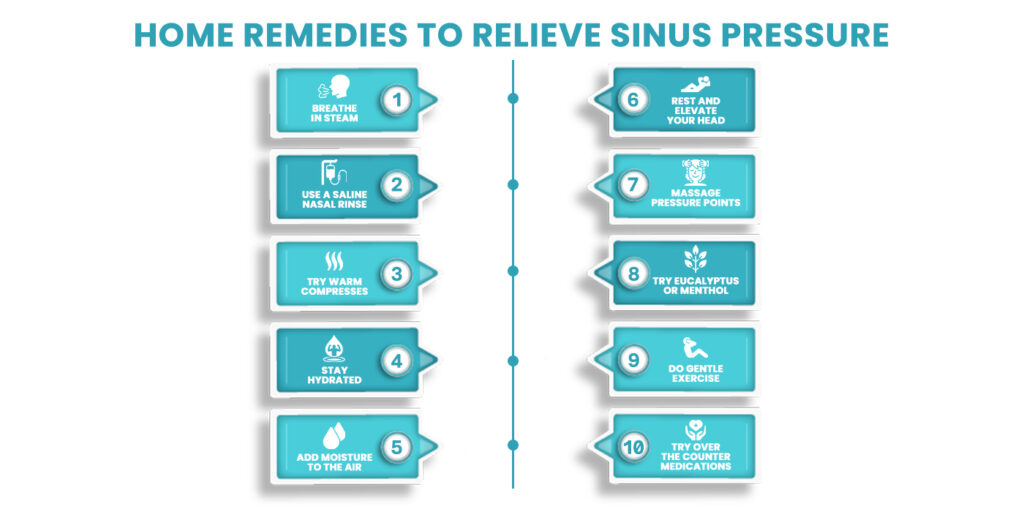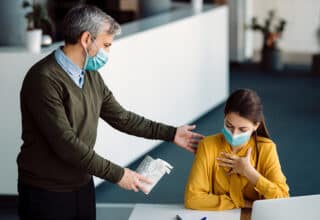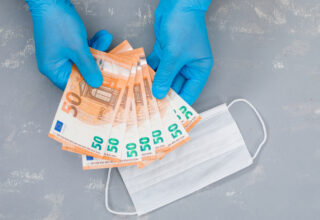What is Sinus Pressure?
Sinus pressure can be very uncomfortable and disrupt your daily routine. Whether it is caused by a cold, allergy, or sinusitis, in most cases it can be managed at home with a few simple remedies.
Let’s understand what sinus pressure is and 10 simple tips that can help relieve sinus pressure at home.
What is Sinus Pressure?
Sinus pressure occurs when the lining of your nasal passages becomes inflamed or swollen—due to colds, allergies, sinus infections, or other conditions. This inflammation can cause mucus to build up and block normal drainage—causing pressure and pain.
Sinus pressure feels like a dull ache or tightness in your face—especially around your eyes, nose, forehead, and cheekbones. The pain gets worse when leaning forward, bending down, or making sudden head movements.

10 Tips to Relieve Sinus Pressure at Home
1. Breathe in Steam
Steam is one of the simplest and most effective ways to relieve sinus congestion. It helps moisten dry nasal passages and loosen mucus.
Take a bowl of warm water and lean over it so your face is a few inches away from water. Cover your head with a towel and inhale deeply for a few minutes.
Other than this, you can also take a hot shower and breathe in the steam. Just make sure the water isn’t too hot to avoid any burns.
2. Use a Saline Nasal rinse
A saline nasal rinse—using a Neti pot or saline spray—will help relieve sinus pressure and congestion. It’ll help wash out allergens, bacteria, and excess mucus from your nasal passages. This simple habit can help you breathe more easily and reduce sinus infections over time
Make sure to use distilled or boiled (then cooled) to reduce the risk of infection.
3. Try Warm Compresses
Placing a warm, damp towel across your nose, cheeks, and forehead can help reduce swelling and open up your sinus passages. The warmth improves circulation and helps loosen mucus.
You can apply warm compresses for a few minutes and then take a break for a few minutes.
Try it several times a day, especially before bed time.
For extra relief, alternate with a cold compress—try 3 minutes of warmth followed by 30 seconds of coolness.
4. Stay Hydrated
When you drink plenty of fluids it helps keep your mucus thin and easier to drain. Try to drink at least 8 glasses of water a day. Other than plain water, you can also take clear broths or herbal teas—they can give an added soothing effect.
Hydrating fruits and vegetables like watermelon and cucumber, and soups will also help.
5. Add Moisture to the Air
Dry air can irritate your nasal passages and worsen congestion. Use a humidifier in your bedroom to maintain a comfortable moisture level in the air—especialy during the winter months or if you use central heating.
Remember to clean your humidifier regularly to prevent mould or bacteria build-up.
6. Rest and Elevate Your Head
Rest gives your body time to heal, so try to get plenty of sleep. When you’re taking rest, your body produces more white blood cells that help your body fight against viruses and bacteria.
When lying down, prop your head up with extra pillows. This will help your sinuses to drain instead of blocking them up.
7. Massage Pressure Points
There are different points in your face where sinus pressure tends to build up. These areas include your forehead, temples, area above your forehead, near your nose, between your cheekbones and jaw, either side of your nose bridge, and in front of your ears.
You can massage these areas with your fingers in a circular motion to help relieve your symptoms.
8. Try Eucalyptus or Menthol
Eucalyptus oil contains cineol—a compound that may help reduce sinus inflammation and congestion. You can inhale it after adding a few drops into a diffuser, bath, or a bowl of hot water.
Menthol rubs like vapour rubs can’t physically relieve congestion. But they can give a cooling sensation in your nasal passages and make breathing feel easier.
9. Do Gentle Exercise
A little exercise can go a long way. Although it’s difficult to exercise when sick, it helps a lot. Light exercise such as walking or gentle yoga can help improve blood circulation and drainage of your sinuses.
On the plus side, exercise also helps release endorphins which make you feel better and also reduce stress.
10. Try Over-the-Counter Medications
If natural remedies are not enough, you can try over-the-counter medications like:
- Decongestant sprays—they provide short-term relief but shouldn’t be used for more than few days in a row
- Antihistamines—if allergies are triggering your symptoms
- Expectorants—they can help break up mucus
- Pain relievers such as paracetamol and ibuprofen to relieve headache and facial pain
If you’re taking any other medications or have any existing health condition, always check in with your doctor before taking a medicine.
When to See a Doctor
Most sinus infections get better within a week or two, but it’s important to see your doctor if you have:
- Symptoms that last longer than 10 days
- Severe or worsening pain
- Swelling around your eyes or forehead
- A high fever
- Recurrent sinus infections
Final Thoughts
Sinus pressure can feel quite uncomfortable. But with some rest, hydration and simple home remedies, you can get better within a few days. Try combining a few of these natural approaches to relieve sinus pressure and see what works best for you.
If your symptoms persist or are severe, it’s best to check in with your doctor.








